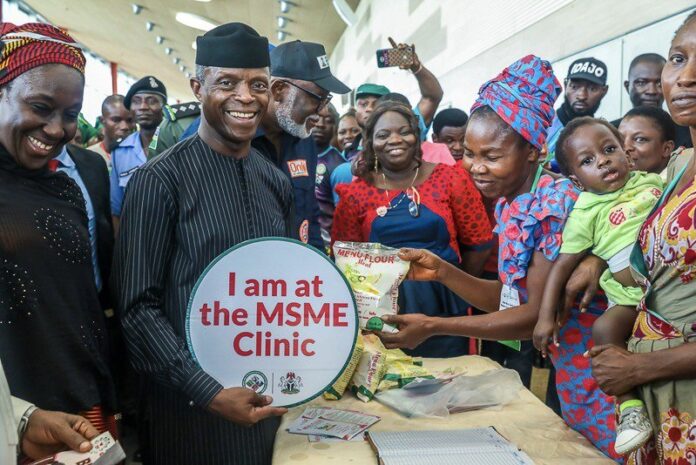Ms Mariam Katagum, the Minister of State for Industry, Trade and Investment, has reiterated Federal Government’s commitment to policies that will support Micro Small and Medium Enterprises (MSMEs).
Katagum said this on Monday in Abuja at a ceremony to mark the 2022 World MSMEs Day, organised by the Small and Medium Enterprises Development Agency of Nigeria (SMEDAN).
The theme of the event was “Resilience and Rebuilding: MSMEs for sustainable development at the forefront of building back better and stronger from the impacts of the COVID-19 pandemic, climate crisis and conflicts’’.
Represented by Mr Adewale Bakare, the Director, Industrial Development Department in the ministry, Katagum said that the role of MSMEs in creating jobs and growing the country’s economy was a pertinent reason to celebrate them.
According to her, the role of MSMEs in stimulating economic growth cannot be overemphasised.
“The Federal Government is committed to formulating policies that will support MSMEs and stimulate economic growth and attract Foreign Direct Investments (FDIs),’’ She said.
The minister, however, called for stronger collaboration among stakeholders, saying that it was critical in promoting activities of the subsector.
Earlier, the Director-General of SMEDAN, Olawale Fasanya, said that the agency would continue to support the birth of new enterprises and the scaling up of existing ones.
According to Fasanya, this is critical in achieving our overall objective of building a critical mass of MSMEs that will drive sustainable economic growth and development in Nigeria.
While assuring of the agency’s willingness to explore available economic opportunities, Fasanya urged every sector of the economy to reinvent themselves and be positioned to contribute to economic growth and development.
He said that SMEDAN was focusing on strengthening MSMEs supply chain to power self-reliant MSMEs, policy, technology, leadership and skills needed to drive the ecosystem.
“This will develop new capabilities, knowledge and structures to align with the new realities within the world new economic system.
“It is a known fact that MSMEs are the backbone of every economy across the world.
“They also account for more than 90 per cent of businesses and 60 per cent to 70 per cent of employment worldwide.
“Thus, the MSME sub-sector play very pivotal role in stimulating economic growth, supporting inclusive growth, creating decent jobs and a key vehicle for poverty reduction and improving livelihoods,’’ Fasanya said.
He, however, blamed the shrink in the total number of MSMEs and their contributions to Nigeria’s Gross Domestic Product (GDP), employment and export on insecurity and COVID-19 pandemic.
“The national MSMEs survey conducted by SMEDAN in partnership with the National Bureau of Statistics in 2020 revealed that there were about 39.6 million MSMEs, contributing 46. 31 per cent to the country’s GDP and 6.21 per cent to exports.
“These figures have shown a significant shrink in the total number of MSMEs when compared to the survey results of 2017.
“Some of the reasons for the drop in the number of MSMEs are worsening case of insecurity, banditry and the novel COVID-19 Pandemic,’’ Fasanya said.
He urged MSMEs to become more resilient to future shocks.
According to him, deliberate efforts and stimulus packages must be targeted at those most heavily affected by disruptions to global supply chains, rising inflation and the continuing devastating effects of the COVID-19 pandemic.
He further emphasised the need for policymakers to deliberately go beyond recovery and consider other ways to eliminate challenges faced by MSMEs, improve the business environment and enhance access to affordable finance.
Fasanya said there was the need to also increase access to local, regional and global markets and technology.
“It is imperative that nations and their international development partners should continue to support and empower MSMEs toward unlocking their full potential through inspiring innovation, creativity and decent work for all,’’ he said.




